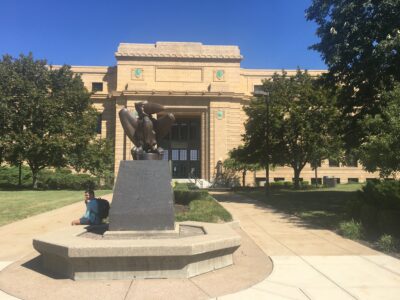University of Kansas halts employee vaccine mandate after federal judge in Georgia issues injunction

photo by: Kim Callahan/Journal-World
Strong Hall on the University of Kansas campus is pictured in September 2021.
Story updated at 4 p.m. Tuesday:
The University of Kansas is pausing its employee vaccine mandate process, effective immediately, after a federal judge in Georgia issued an injunction halting implementation of the federal COVID-19 vaccine mandate for federal government contractors and subcontractors.
KU employees do not need to take any further action related to the mandate at this time, Chancellor Douglas Girod said in a message to staff on Tuesday.
“We will keep you posted on developments related to this matter,” the message said.
The federal mandate, which was set to take effect on Jan. 18, applies to roughly a quarter of the U.S. workforce and affects entities, like KU, that do business with the federal government.
KU, like other universities that receive federal research grants, had determined the mandate required all employees on campus to be vaccinated — unless they received a medical or religious exemption — in order for KU to remain eligible for a host of federal contracts.
However, U.S. District Judge R. Stan Baker in Augusta, Georgia, temporarily halted the vaccine mandate program while legal challenges to the plan work their way through the courts. In issuing the injunction, Baker determined it is likely that courts ultimately will rule President Joe Biden exceeded authorization from Congress when he issued the requirement in September.
Baker, an appointee of President Donald Trump, ruled Biden’s executive order “goes far beyond addressing administrative and management issues in order to promote efficiency and economy in procurement and contracting, and instead, in application, works as a regulation of public health, which is not clearly authorized under the Procurement Act.”
The injunction marked a sudden change in course for KU. Less than two hours before KU announced it was pausing the vaccine mandate program, Girod’s office had released a video message to employees reminding them of the mandate’s requirements and urging them to either get vaccinated or file an exemption request.
“Our best defense here is the vaccination route in terms of keeping everyone healthy on campus,” Girod said.
Without the federal vaccine mandate, however, it appears unlikely that KU has a path for implementing its own vaccine mandate program. KU has argued that a state law prohibits KU from requiring any students or employees to show proof of vaccination as a condition of employment or enrollment at the university. KU leaders previously have said the university would be at risk of losing its state funding if it proceeded with a vaccine mandate of its own.
On Tuesday, a spokeswoman for KU said those concerns remain.
“We remain limited by state law in our ability to require vaccines or proof of vaccination,” spokeswoman Erinn Barcomb-Peterson said via email.
Girod on Oct. 22 issued the directive to all KU employees to comply with the vaccine mandate or risk losing their jobs. At that time, a KU spokeswoman said the university’s “best guess” was that about 80% of employees and staff members were vaccinated. KU didn’t have hard data on the vaccination rates because state law prohibited the university from requiring staff members to provide it. On Tuesday, KU said it now has hard data showing vaccination rates are above 80% among faculty and staff.
“As of today, approximately 83 percent of Lawrence and Edwards campus employees have uploaded documentation confirming they are fully vaccinated. We believe the actual vaccination rate among our employees to be even higher than that,” the message said.
KU, at the request of the Journal-World, also provided information about the number of religious and medical exemptions KU had granted as part of the now-paused vaccine mandate program. Barcomb-Peterson said KU had issued 161 religious exemptions and 32 medical exemptions related to the mandate. The 193 exemptions in total amounted to about 2.2% of KU’s workforce, although that number conceivably could have grown larger as KU was still accepting exemption applications when the mandate was paused on Tuesday.
A new state law essentially requires KU to approve any application for a religious exemption, although it does have more leeway to deny medical exemptions.
Girod thanked everyone who had followed the mandate so far, and urged others to consider vaccination.
“If you have not yet been fully vaccinated, we encourage you to do so,” Girod and Mike Rounds, vice provost for human resources, public safety and operations, said in a message to employees. “If you are eligible for a booster, we encourage you to seek out that opportunity.”
The lawsuit that resulted in the injunction was brought forward by several contractors and seven states, including Kansas. Kansas Attorney General Derek Schmidt hailed the preliminary decision in the case.
“Federal courts continue to recognize that these overreaching, one-size-fits-all mandates from the Biden administration are unlawful,” Schmidt said in a release. “I continue to encourage Kansans to be vaccinated, but that personal health care decision should be made by each individual and not mandated by the federal government.”







COMMENTS